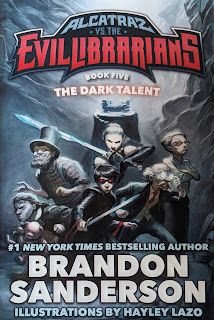Special Topics in Calamity Physics by Marisha Pessl
D'oh. I typed a bunch and then it seemed to disappear. Uggh. Lets try again. I had initially thought this book was science fiction. The title seemed science-ish, and the narrator of the audiobook narrates many of Orson Scott Card's science fiction books (hmmm... probably since he is her father.) When there was a statement about someone feeling they were a 70 foot tall tree, a took that literally and was looking for some outlandish space travel. I totally missed the part about the death of a teacher.
The book is written in the style of a college course (with a final exam.) The chapters have titles of literary works, and there are plenty of annotations throughout. It is a great, innovative style that keeps things interesting without distracting from the work.
The narrator of the book is smart girl that loves books and movies, but has very little social experience. This is her coming of age story. Her mom died when she was five and she had lived with her dad, an itinerant college professor. Her senior year in high school, her dad finally agrees to let her settle down in one place, "Stockton, North Carolina."
The one peeve I had with the book is the pseudo-place names. There are abundantly quoted "real" works of literature and movies. However, almost all the names of places and universities are made up. (I even tried to look some up.) I prefer to have my places "real" or non-existent. Having "almost real" places is just annoying.
She tries to fit in with a group of drama nerds that hang around the film teacher. She does stuff with them, and they all have experiences together. At one point, they sneak into an "adult" party, and see somebody die by drowning. This brings the first significant tragedy to the group. Later, the group goes on a camping trip with the favorite teacher. During the trip, the narrator discovers the teacher hanged, and the others get lost. This destroys the balance of the group, and narrator finds herself outcast and looking for answers to how and why. The police deem it a suicide, but she doesn't buy that. Her quest eventually leads her to uncover a link between the teacher, a crime organization, the early murder and her father. After she shares this with her father, he disappears in the night, never to see her again. It turns out that the university work, though real, was cover for her father's work with the organization. She even knew many figures in the organization. She never did find out who had killed the teacher, but she did find out a lot about herself during the course of events.
The style keeps the book interesting. The pacing could use a little work. The start of the book mentions that it is about the murder of the teacher. However, it spends a long time getting there. Once it gets to that point, it quickly zooms to the crime conclusion. There is almost no time spent going down false paths or building up suspense. It seems as if it is a coming-of-age tale that just had to have a murder tacked on to allow it to be a "mystery". This final bit is also the key point that completely changes her relationship with her father (and thus alters her life.) I am fine with the sudden ending, but would have liked to see it balanced with less exposition. (Or if keeping all the earlier parts, it would be nice to balance the ending by exploring the relationships in more detail.) Luckily, the style (and constant literary allusions) kept it interesting, even when the substance slowed down.


